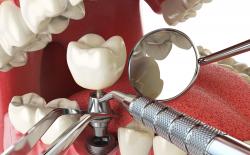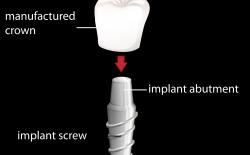What is a zirconia implant and what is a titanium implant?
Implants are commonly used to replace the missing natural teeth.
Dental implants have greatly replaced the other treatment options for replacing missing teeth, like conventional removable dentures, dental bridges supported by natural crown abutments.
Titanium implants have been used in clinical practice since the 1980s, before that heavy research has been done for over a decade.
Titanium has great physical properties, which made the use of titanium implants very successful, giving favorable results.
The two main disadvantages are:
- its silver color, which usually doesn't cause much esthetic problem as the implant is placed inside the jaws and is not visible
- it's a metal and can cause allergic reaction in some patients (however allergic reactions to titanium are very rare)
To overcome these disadvantages, zirconia implants have been introduced in clinical dentistry in the early 2000s.
Zirconia is ivory colored, it is the toughest material known amongst the ceramics used in dentistry and it's metal-free.
What are the differences between titanium and zirconia implants?
Material
Titanium
Titanium implants are made from titanium alloy, commonly combined with aluminum, vanadium and nickel.
Zirconia
Zirconia is zirconium dioxide. It is in crystalline form. Even though zirconium is a metla, its oxide - zirconia - have very different properties and is not considered to be a metal.
Strength
Titanium
Titanium is very strong with a tensile strength of 434 MPa. This can bear the masticatory load efficiently without fracturing easily.
Zirconia
Zirconia has a tensile strength of 330 MPa. This can also serve the function of mastication. But lesser when compared to titanium implants.
Design of the implant
Titanium
Titanium implants are available in two pieces to form an implant system: the artificial root (the implant or screw) and an abutment, on which an artificial crown is placed.
Zirconia
Zirconia implants are usually available as a one piece system in which the screw and the abutment is combined to form a single unit. In the past few years some companies have developed two-piece ceramic implant solutions.
Cost of the implants
Titanium
The average cost a titanium implant is around $350- $500.
Zirconia
Zirconia implants cost around $500 - $600 per implant. So zirconia implants are more expensive, mainly due to the research and manufacturing costs.
Please note this is the price your dentist pays to the manufacturer. As a patient you'll be paying for the time and experience of the dentist and some additional treatments (like cleaning, crowns or bridges, maybe bone grafting or root canal).
The price of a complete tooth restoration in the US is around $3,000 - $5,000. If you want to know more about prices, please our article about dental implant costs.
Esthetics
Titanium
Titanium implant when placed in a normal healthy condition with adequate bone levels and volume, does not affect the esthetics negatively.
However reduced bone height , thinner gingival tissue, recessed gums might make parts of the metal screw visible.
Zirconia
Zirconia implant is known for its superior esthetics. It is an ivory colored crystalline material. It gives a very real look as that of a natural tooth.
Durability
Titanium
They have an excellent durability and can serve for years together successfully.
On an average they last for 15 years. According to some studies, even after 30 years it showed minimal damage when maintained properly.
Zirconia
Zirconia implants were introduced in clinical practice in 2000s. So adequate knowledge on its durability is not known yet.
When to use zirconia implants?
Zirconia implants are used when esthetics is a major concern. Whenever a tooth is lost in the front (anterior) region, zirconia implant can be used.
Reduced bone height, recession of gingival tissues, gums require rebuilding the lost tissue along with the artificial crown with the help of resins and ceramic to duplicate the gingiva and give it close to natural appearance.
In such conditions, zirconia implants gives great results as they are ivory colored and resemble to the natural tooth.
Zirconia can be used in patients with fair oral hygiene as it is a single implant piece, it does not favor plaque retention making it easier to clean and maintain.
When to use titanium implants?
Titanium implants are more commonly used, have a longer - and very successful - track record.
Titanium is mostly indicated in the region of high masticatory load (chewing pressure) that is in the upper and lower posterior regions (back tooth). Titanium resists functional stresses better than zirconia implants, which shows micro- fractures over a longer period of time.
Titanium implants can also be used in the anterior region when the oral health is good, there is an adequate amount of bone and thicker gingiva, which does not cause the implant to reflect from inside.
Which material to use when replacing multiple missing teeth?
Titanium is preferred when replacing multiple missing teeth in a row, e.g. bridges or all-on-4 implants. The most important reason is the strength of the material. Full mouth implant supported dentures also require a material with excellent strength.
In these cases titanium implants also have an additional benefit: they are available in two pieces, therefore small alterations in angulation can be done to achieve better results. Slight adjustments with the crown angulation can also be done by simply adjusting the abutment.
Even if you have titanium implants, zirconia bridges can be fitted to them. Because of its esthetics and durability, zirconia is often used for long span bridges, even full arch bridges can be made from zirconia.
Frequently asked questions
Are titanium and zirconia implants safe?
Yes! Both of them are compatible with the body tissues and can serve well without causing any harm. If you are allergic to titanium then zirconia can be opted for.
How to know if I am allergic to titanium?
MELISA test is a simple blood test which can be taken to find out if you are allergic to titanium. Most of the patients who show allergic reaction after titanium implant placement are actually allergic to nickel which is one of the component of titanium alloy.
Are zirconia implants toxic?
No! Zirconia is biocompatible and does not irritate the oral tissues. Moreover, it is a metal free implant and prevents conduction of electric charge which keeps the surface plaque free thereby improving the health of the gums .
Zirconia does not leach out from its surface into the blood stream so there is no chance of toxicity with zirconia implants.
Which among the two titanium or zirconia implant would be better for me?
No two cases are the same and there is no definitive answer to this question. You need to discuss the pros and cons of both materials with your dentist, who will help to choose the better option for you,
Why does a titanium implant show recession after its placement?
Titanium implants are commonly available in two pieces . There is a joint between the root portion and the abutment.
This portion becomes the favorable site for plaque accumulation and microbial growth, if they are not kept clean.
This is the most common reason affecting the periodontal health leading to bone loss in the vicinity of the implant followed by gingival recession or implant infection, which can eventually lead to implant failure.
This can be avoided by practicing good oral hygiene practices.
You might also be interested in:
Titanium Dental Implants
The usage of titanium in implantology has a long history. Titanium implants are durable and have a very good success rate as allergic reactions to this metal are very rare.
Zirconia Dental Implants
Rare allergic reactions or aesthetic reasons can sometimes indicate a zirconia implant instead of titanium. Zirconia implants are relatively new but look very promising.
Dental Implant Costs
Tooth implants are quite expensive, a single tooth restoration (crowns included) can be around $3,000 and $5.000. Read our article to find out what factors affect the price of an implant.


